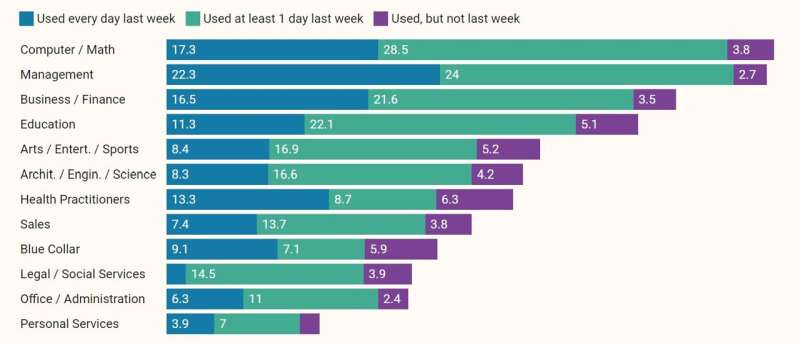Generative AI, exemplified by ChatGPT, has been adopted by the public at a rate significantly faster than the internet and personal computers. According to a new survey, nearly 40% of U.S. adults aged 18-64 have used generative AI, with 28% using it at work and 33% using it outside of work. This rapid adoption rate suggests that generative AI could have a profound economic impact, much like the personal computer and the internet before it.

Quick Like the Internet & PC
But the survey, by researchers from Harvard Kennedy School and Vanderbilt University, says generative AI is gaining acceptance more quickly than did the internet or personal computers. It took the internet 2 years to reach 20% adoption among the same demographic, and three years for personal computing to do the same — generative AI is getting there in just under six months, having reached nearly 40% of U.S. adults aged 18–64 by August 2022,(propertyValue).
That usage rate was impressive enough — higher than what the researchers expected of their fellow academics. They credit this fast diffusion to the fact that generative AI is layered upon the existing infrastructure of personal computers and the internet, it is more approachable and pluggable into people’s lives.
Broad and Diverse Adoption
At the same time, this AI system has been implemented in a variety of jobs – such as STEM work, management and even some blue-collar jobs. The research indicates that use is most common in naturally telco, science, technology, engineering and mathematics (STEM) and management roles but 22% of blue-collar workers are also now using generative AI. It says that the technology is no longer confined to just certain industry segments or job types, it’s progressing more universally.
Those applications are in wide use already: The majority are informal, such as when people utilize generative AI to help them write emails or find information versus businesses formally deploying and integrating the tech into their operations. Which means that we are still experiencing just the tip of the iceberg in terms of what generative AI can do to the labor market and overall economy.
Implications for the Future
This wide use of generative AI has major implications for the future. The researchers think that generative AI could become just one more fundamental technology, like the PC or the internet that comes before it. As just the previous generation of technologies created various industries and business opportunities, so will those researchers envisage generative AI that generates a new businesses and use cases.
They point out that more firms needs to take notice of the trend and consider how they can seize advantage of generative AI for new products, services, and competitive edges. It is much like the early days of personal computers and the internet, where those that can first find the ‘killer app’ for generative AI will have a huge leg up in years to come.
